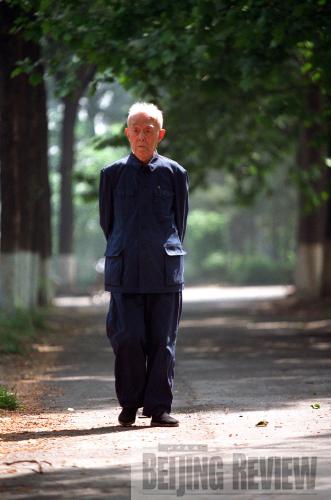|
 |
|
SIMPLE BUT GREAT LIFE: Ji Xianlin walks on the campus of Peking University in 1997 (TANG SHIZENG) |
Always plainly dressed and amiable, Ji Xianlin wouldn't be given a second glance in a crowd. Yet looks can be deceiving. He was the country's leading scholar of Chinese culture and was seen as a national treasure.
Life's work
Ji has long been a luminary because of his contribution to the study of Chinese culture and cultural communication among different countries.
Born in 1911, Ji was enrolled in Tsinghua University in 1930, majoring in Western literature. Five years later, as an exchange student, he went to Germany, where he set his study area in ancient languages including Sanskrit, Pali and Tocharian. He received his doctorate in 1941.
After returning to China in 1946, Ji was employed by Peking University, where he founded the Department of Eastern Languages, the first of its kind in China. To this day Peking University is still the only university in China that offers a major in the ancient languages of Eastern Asia.
During the "cultural revolution" (1966-76), Ji secretly translated the 80,000-line Ramayana, the world famous Indian epic, from Sanskrit into Chinese, as translating foreign literature had been banned. He spent five years on this project, which was a historical landmark in Sino-Indian cultural exchange.
"Indian culture has a strong influence on Chinese philosophy and culture, and one cannot understand Chinese culture very well without learning the ancient Indian culture," said Ji, when asked the use of studying the ancient Indian language.
In addition to his translation of Ramayana, Ji wrote seven books including a short history of India. During his later academic years, Ji published 11 academic books and over 200 papers involving more than 10 academic fields, including Chinese cultural research, comparative literature, and Sanskrit.
In 2006, Ji received a lifetime achievement award from the Chinese Government for his contributions to the field of translation. On January 26, 2008, the Indian Government granted Ji the Padma Bhushan award, in recognition of his outstanding academic achievement. It was the first time the honor was awarded to a Chinese scholar.
| 